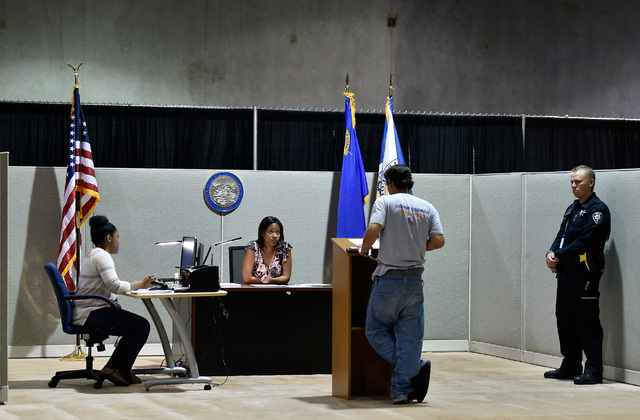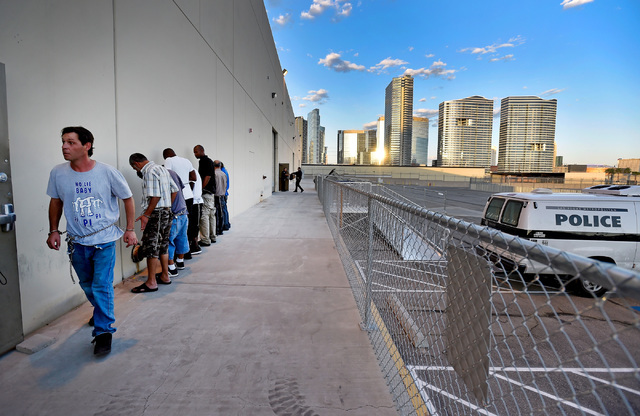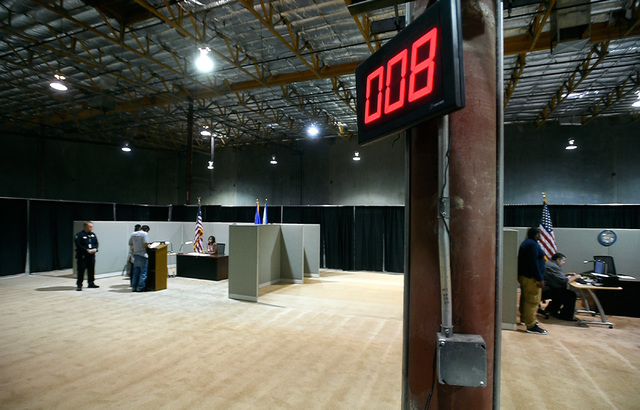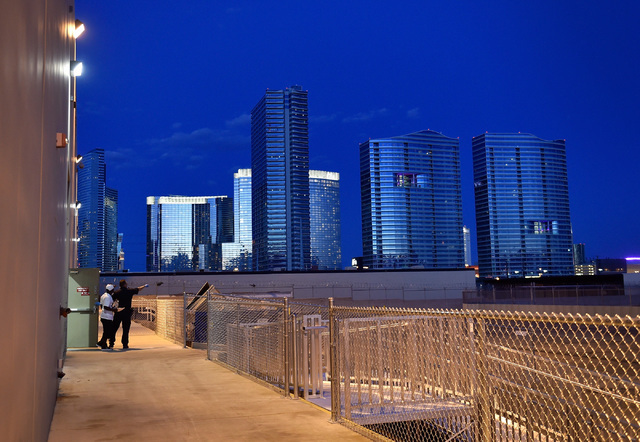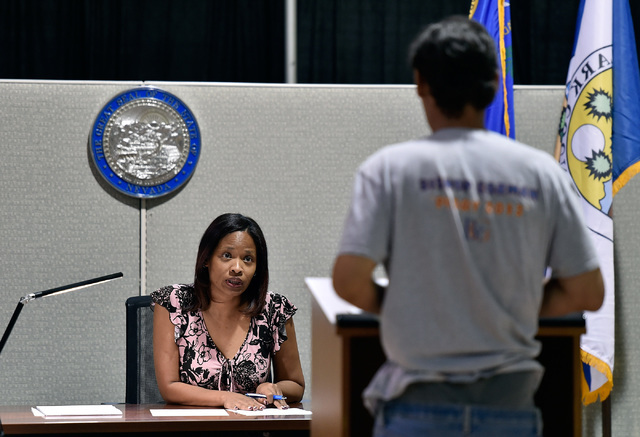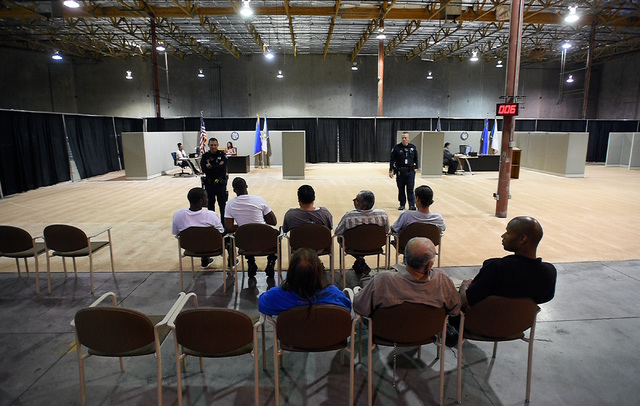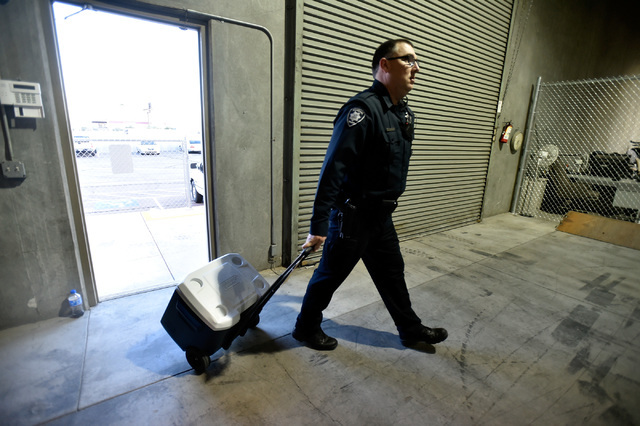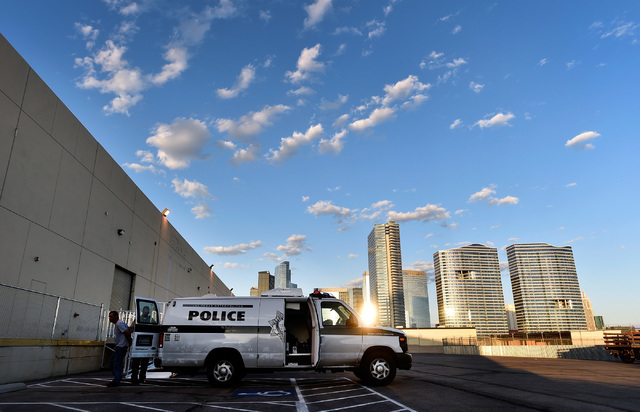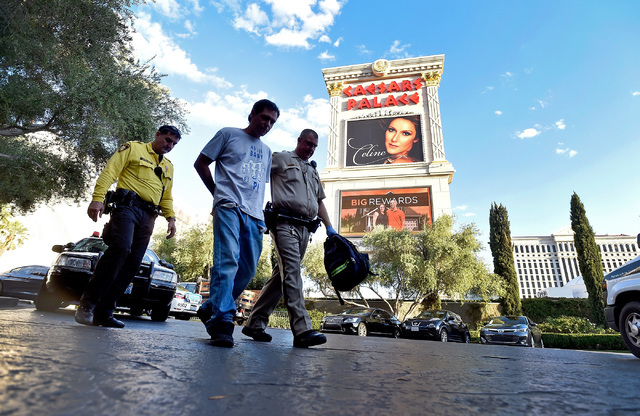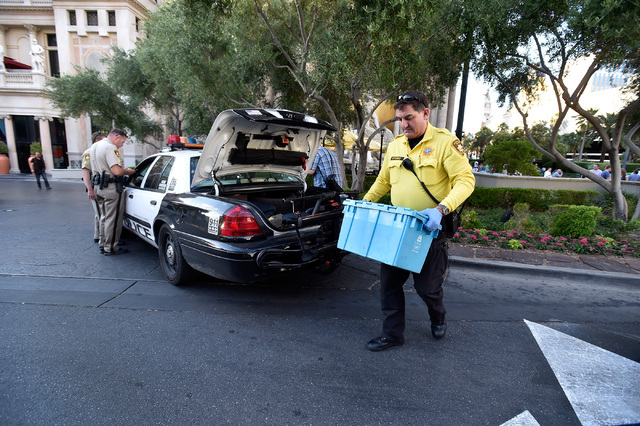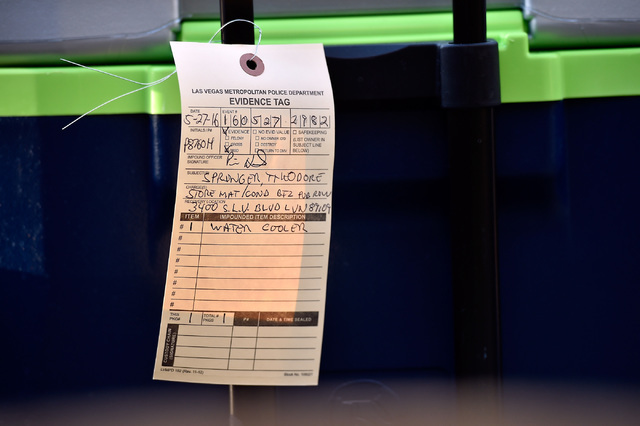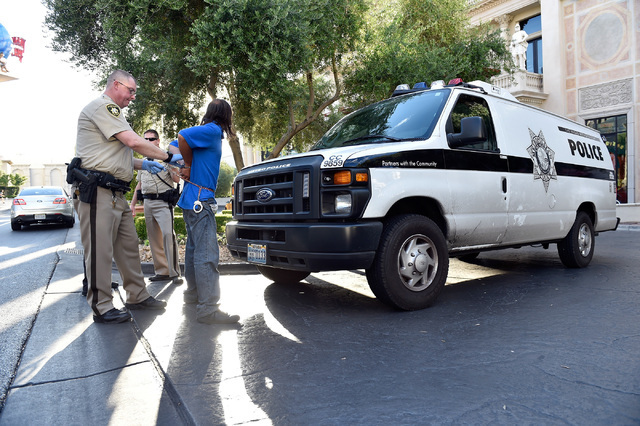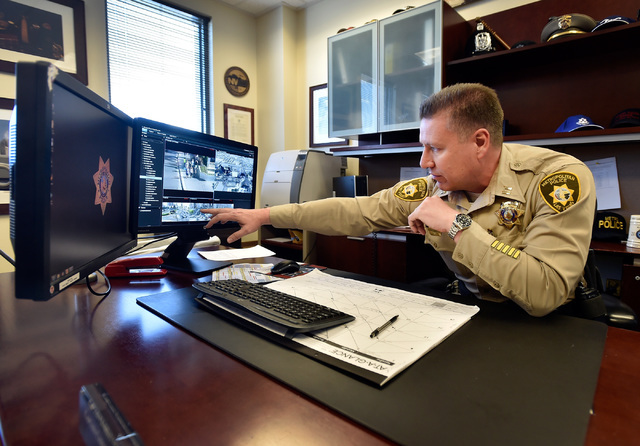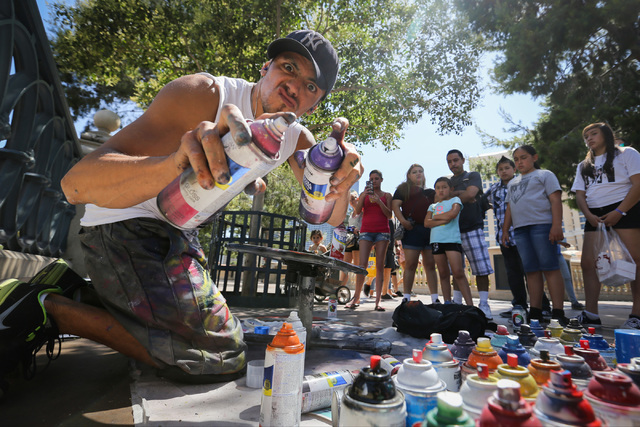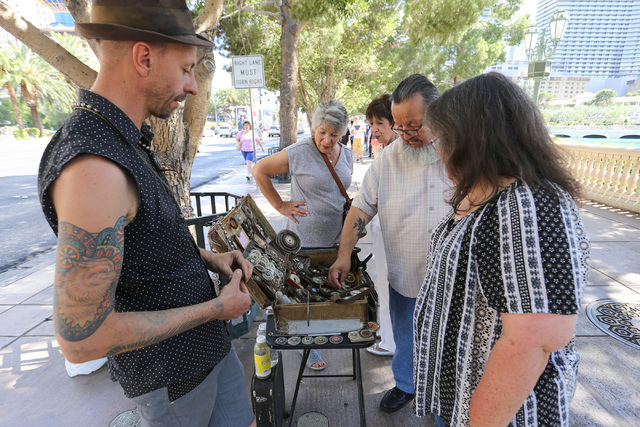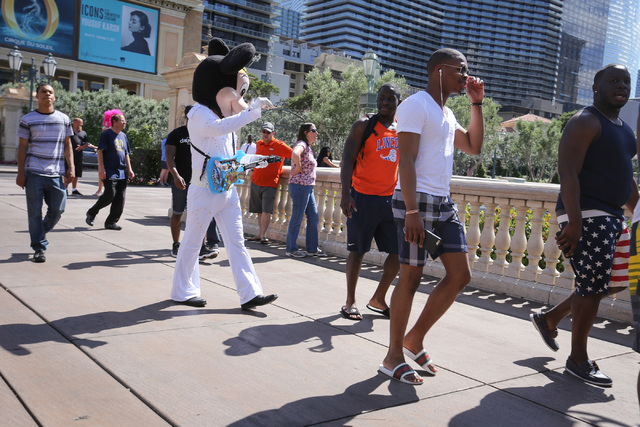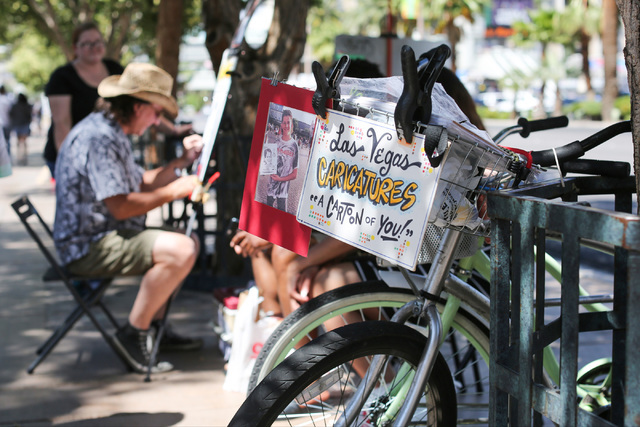Off-Strip county court may help relieve detention center crowding
Clark County quietly opened a new court facility just west of the Strip on Friday night.
It’s not much of a looker — the court is housed inside a nondescript warehouse behind the Cosmopolitan, filled with rows of chairs, a swatch of concrete to cover half the building’s concrete floors and a mobile bathroom truck parked inside. But the repurposed space allows the county and the Metropolitan Police Department the means to do something they’ve wanted to do for years: enforce ordinances that keep people from illegally selling goods — like water bottles and sunglasses — in the resort corridor.
The new facility works as a “civil diversion program,” which means the people who are cycled through it are kept separate from the criminal justice system — instead of being booked at the Clark County Detention Center, they’re slapped with a fine and their items are impounded, which is supposed to deter them from selling goods illegally again.

And none of it goes on their criminal record.
The county’s incentive in putting the facility together lies with the millions of dollars spent over the last few years to improve the pedestrian experience on the Strip. Since 2012, officials spent $5 million to remove 11 fire hydrants, relocate six fire hydrants, install and remove about 150 signs, and widen 1,700 linear feet of sidewalk.
Yet while all that money was spent to improve increasingly crowded sidewalks, county spokesman Erik Pappa said those “permanent obstructions” have been slowly replaced by “non-permanent obstructions.” And by non-permanent obstructions, he means people.
“Over the last several years, we’ve had a number of problems,” such as people selling sunglasses and water on pedestrian bridges, he said. The county commission passed ordinances barring commercial activites and unsafe activities — including things like fire and knives — on the sidewalks and pedestrian bridges in 2012.
But law enforcement resources have been strained.
“Historically, it’s like trying to empty out the ocean with a teaspoon,” Metropolitan Police Department Capt. Chris Tomaino said.
His substation, which is in charge of the resort corridor, has been operating with about 20 fewer officers than it should, forcing officers to work nights and weekends and focus on more serious crimes.
“Is it the same as dealing drugs? Absolutely not,” Tomaino said of people selling items illegally on the Strip. But he explained that many vendors cause different problems; sometimes water bottles are re-bottled with alcohol or water from an unknown source. And many of the people selling CDs often sell blank ones, taking the money in exchange for no music.
The exchanges typically take advantages of tourists on the Strip in small ways, even if the vendors are just trying to make a buck. And in some instances, the exchanges have been gateways to robbery.
“We were trying to find a way to deal with it without making a mountain out of a molehill,” Tomaino said.
That’s why he and other Metro officials were eager to be a part of the new facility and program, a collaboration between Metro, the county and the Las Vegas Justice Court. While officers working regular Strip patrols will continue about their shifts, the county is funding overtime for separate officers over the next 60 days to tackle the vendors program head-on.
Each day over the next two months, about eight officers on overtime will be deployed for about four hours at a time on the Strip, loading up violating vendors into a police paddywagon and hauling them over to the new facility. The four-hour shifts will happen at random each day, so vendors won’t know when to expect police.
At the warehouse court facility, housed at 3550 W. Harmon Ave., up to three Las Vegas Justice Court judges at a time will work through the arrestee’s non-criminal cases; the judges aren’t getting paid overtime because they’ll be working the new shifts into their current schedules.
The casework itself is a quick process. Those arrested take a number, just like at the DMV, then they’re called up to the stand, which is really just one of three cubicles furnished with a judge’s desk, a stenographer’s desk and a lectern for the arrestee. There’s also a U.S. flag, a state flag and a county flag at each station, complete with a state seal hanging behind the judge.
“It’s bare bones,” Pappa, the county spokesman, said.
But despite the temporary look of the place — a large air-conditioning unit was just installed with a crane Thursday — Pappa said it allows the arrestees to avoid jail time for minor offenses, and it frees up jail space for violent offenders.
From January to April, the average daily population at the county jail has increased 10.3 percent, from 3,697 in January to 4,077.
The jail’s operational capacity, which includes beds but not the cots used for overcrowding, is 3,868. On Thursday the jail had 3,792 inmates. On Wednesday there were 831 people behind bars for misdemeanors, police said.
Besides bed space, the holding space for bookings has been cut in half during renovations, which means the jail reaches capacity for new bookings quickly. On Friday night alone, the jail was holding 233 people for booking, just 17 shy of its 250-person capacity.
Clark County Commissioner Marilyn Kirkpatrick said she’s excited about the new program, which was approved by the County Commission about a month ago.
“I think that we always have to do things a little bit different in Nevada,” she said, pointing to the state’s unique tourism situation.
She said the new program will address an important public safety issue on the Strip and save the county money in the long run. The cost savings come from the fact that the building was already owned by the county — acquired during a county roadway project but ultimately not used, though it cost $45,000 to repurpose.
The program may also serve as an educational opportunity for someone who may not know about the ordinances.
“Many people don’t know the rules,” she said. “This will help educate them.”
Las Vegas Justice of the Peace Joe Bonaventure, who will act as one of the hearing officers for the new program, said the program works by giving people the option of avoiding criminal liabilities by admitting to civil liability.
First-time offenders will face a fine between $250 and $1,000 per violation. Then the fines go up for each subsequent case, starting at $500 for the second offense and $750 for the third. After that, the fine will be the maximum amount of $1,000 for each future violation.
Offenders can also apply the value of their impounded property to their fines.
By contrast, street vendors arrested and booked into the detention center will face up to six months in jail, a $1,000 fine, or both if convicted.
“There does seem to be a public safety element that is pretty compelling,” Bonaventure said. “I’m curious about the process.”
On Friday, the first night of operations, Metro picked up nine people during the first hour of the vendor-targeting shift. One man, whose case was handled by Bonaventure, got off with a warning instead of a fine. The cooler he was using to illegally sell water bottles was left at the warehouse, but he took with him a piece of paper, which listed all the county nuisance ordinances.
An officer unclicked the man’s handcuffs, walked him out of the warehouse, and gave him directions on how to get back to the main road.
“Thank you,” the man said, walking away. “Thank you sir,” he said, louder.
Should the 60-day trial run go well, the county is considering expanding the new program to all minor misdemeanor cases in the county.
“It’s kind of a big experiment,” Tomaino, with Metro’s resort corridor substation, said.
Contact Rachel Crosby at rcrosby@reviewjournal.com or 702-387-5290. Find @rachelacrosby on Twitter. Contact Wesley Juhl at wjuhl@reviewjournal.com or 702-383-0381. Find @WesJuhl on Twitter.




